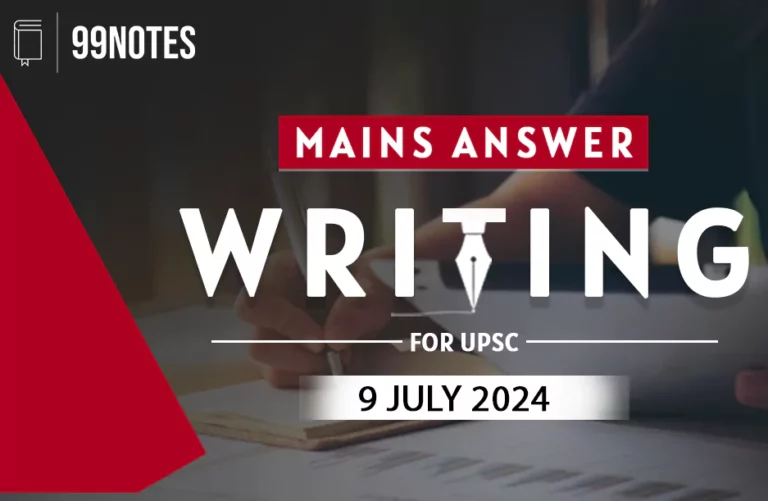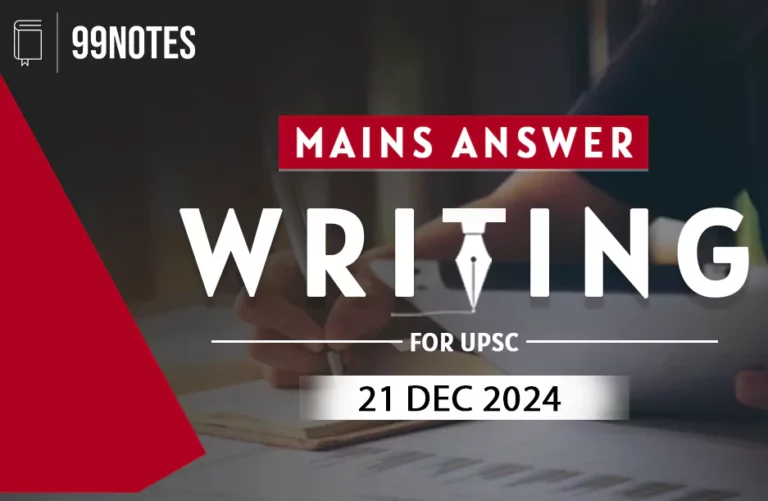12 Oct 2023 : Daily Answer Writing
Mains Answer Writing
12-october-2023
Q1) Discuss the role of the Supreme Court of India in strengthening the hands of the Election Commission in the discharge of its constitutional responsibility of conducting free and fair elections in the country.
ANSWER:
- The process of free and fair elections is a part of the Basic Structure of the Constitution as stated by the Supreme Court in Indira Gandhi vs. Raj Narain Case 1975. The Supreme Court through its various judgments and decrees has contributed to the effective and smooth functioning of the Election Commission which has the power of superintendence, direction, and control of elections under Article 324 of the Constitution.
ROLE OF THE SUPREME COURT OF INDIA IN STRENGTHENING ELECTION COMMISSION
- Appointment: A five-Judge Bench in Anoop Baranwal vs. Union of India, 2023 provided that the Prime Minister, the Leader of the Opposition in the Lok Sabha, and the Chief Justice of India (CJI) shall form a committee to advise the President on the appointment of the Chief Election Commissioner and the Election Commissioners.
- Controlling Expenses: The Supreme Court in the Common Cause vs. Union of India, 1995 directed that the political parties had to file their income tax returns which allowed the Election Commission to efficiently monitor the accounts, revenues, and expenses of political parties.
- Right to Know: In 2003, the Supreme Court, in another landmark judgment, ruled that the electors have the right to know their candidates. They have to file affidavits about their criminal antecedents, assets, liabilities, and educational qualifications. This helped the Election Commission to ensure every detail about the candidate is presented before the voters to cleanse the whole election process.
- Power of Rejecting Nomination: In Resurgent India vs. Union of India, 2013, the Supreme Court declared that if a candidate leaves any column blank in the affidavit, which they have to submit as a necessary part of their nomination paper, the Returning Officer can reject the nomination paper.
- Election Commission’s Power to Scrutinize Expenditure: In Ashok Chavan vs. Election Commission, 2013, Supreme Court upheld the Election Commission’s power to scrutinize the expenditure of candidates and declare the election null and void in case of breach of limits under RPA, 1951.
- Corrupt Practices: Supreme Court in a landmark judgment declared that appeals for a vote on grounds of caste, religion, language, creed, color, and other affiliations by the candidates amount to corrupt practices under Section 123 of the RPA, 1951.
- VVPAT: The Supreme Court (SC), in the case of Subramanian Swamy vs Election Commission of India (ECI), held that VVPAT (Voter Verifiable Paper Audit Trail) is indispensable for free and fair elections.
- Freebies: In S Subramaniam Balaji vs State vs. State of Tamil Nadu, 2013, the Supreme Court said that freebies promised by political parties in their election manifestos shake the roots of free and fair polls and directed the Election Commission to frame guidelines for regulating contents of manifestos under Model Code
- NOTA: In the PUCL Case, 2013, the Supreme Court asked ECI to introduce NOTA (None of the Above), so that electors can exercise their power to reject without disclosing confidentiality. It helped the Election Commission to reduce the influence of money and muscle power as means to get elected.
- Symbol: Election Commission’s power under the Election Symbols Order, 1968 was upheld by the Supreme Court in the recent Shiv Sena vs. Election Commission of India, 2022.
However, there are certain areas that require structural and systemic reforms, which either require legislative or Supreme Court intervention
- Legal Backing of MCC: There is no legal backing for the Model Code of Conduct which restricts its proper implementation and violation by candidates.
- Independent Expenditures: The expenditure incurred by the Election Commission is not charged to the Consolidated Fund of India which is against the principle of independence of the Commission.
- No Power to Deresgister: ECI does not have the power to deregister a political party.
- Electoral Bonds: The anonymity and opaqueness of electoral bonds have posed a new challenge for the Election Commission to track, monitor and audit the expenditure, revenue, and finances of the political parties.
Ensuring free and fair elections are crucial to uphold the essence of parliamentary democracy in India. The Supreme Court has played a very instrumental role in ensuring a free and fair election process, effective representation, the idea of republicanism, and sustenance of the idea of the Indian democratic process.
Upload Answer here
2. Examine the role of strategic minerals in shaping a nation’s economic and technological landscape, and assess the strategies a country can employ to secure a reliable supply of these critical resources.
Answer Will Upload Tomorrow at 12 PM….
Upload Answer here
3. Discuss the key challenges faced by women and youth agri-preneurs in the agricultural sector and propose policy measures to empower and support their participation in building resilient agri-food systems.
Answer Will Upload Tomorrow at 12 PM….
Upload Answer here
4. Discuss the key challenges faced by women and youth agri-preneurs in the agricultural sector and propose policy measures to empower and support their participation in building resilient agri-food systems.
Answer Will Upload Tomorrow at 12 PM….
Upload Answer here
5. What are the challenges and obstacles in the path of United Nations reform, particularly regarding the composition of the Security Council. Analyze the implications of this reform deadlock.
Answer Will Upload Tomorrow at 12 PM….
Upload Answer here
6. Highlight the key reforms required in the Goods and Services Tax (GST) regime in India to make it more efficient, simplified, and taxpayer-friendly. What are the challenges in implementing these reforms, and how can they be addressed?
Answer Will Upload Tomorrow at 12 PM….
Upload Answer here
7. Inefficient functioning of Information Commissions has led to a substantial backlog of pending appeals and complaints under the Right to Information (RTI) Act. Discuss the reasons behind this backlog and suggest measures to enhance the effectiveness of Information Commissions in India.
Answer Will Upload Tomorrow at 12 PM….
Upload Answer here
8. Discuss India’s concerns and objections regarding China’s Belt and Road Initiative (BRI) and its implications for regional geopolitics. How can India address these concerns while fostering connectivity and cooperation in the region?
Answer Will Upload Tomorrow at 12 PM….
Upload Answer here
For Enquiry

13 Oct 2023 : Indian Express

13 Oct 2023 : PIB

13 October 2023 : Daily Current Affair

13 October 2023 : The Hindu Editorial Notes PDF

12 Oct 2023 : Daily Quiz

12 Oct 2023 : Daily Answer Writing

12 Oct 2023 : Indian Express

12 Oct 2023 : PIB

12 October 2023 : Daily Current Affair

12 October 2023 : The Hindu Editorial Notes PDF



